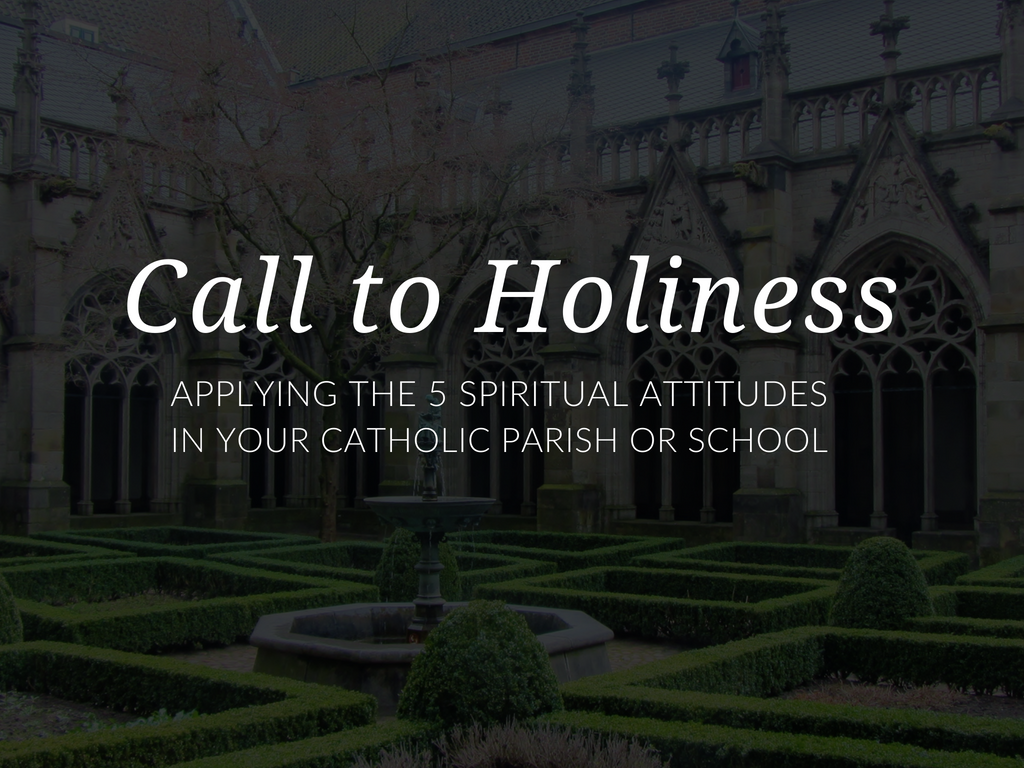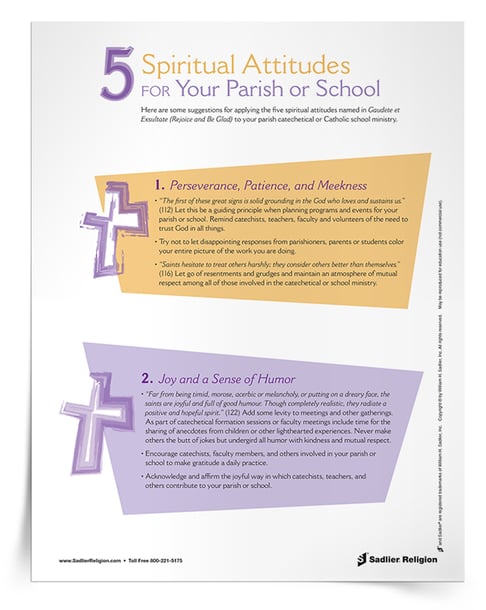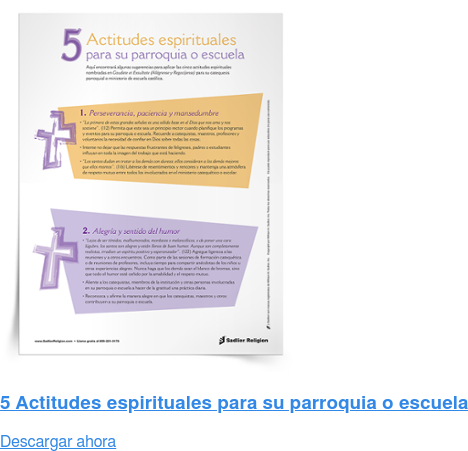July 25, 2018 WBAS Cat Support Articles, REL Catechetical - K–6, REL Catechetical - Jr High, REL Catechetical - Early Childhood, REL Catechetical - Adult, REL Catechetical - Intergenerational, REL Asset - Handout, REL PD - Leaders
Call to Holiness– Applying the 5 Spiritual Attitudes in Your Parish or School
By: Kathy Hendricks
In his apostolic exhortation on holiness, Gaudete et Exsultate (Rejoice and Be Glad), Pope Francis explains the call to holiness and how we might answer it in the midst of our daily lives. In this article, we'll explore how Parish Catechetical Leaders and Catholic School Leaders can answer the call to holiness and use the five spiritual attitudes to strengthen holiness in their personal life and ministry. Included is a tip sheet of suggestions for applying the five spiritual attitudes named in Gaudete et Exsultate in your parish or school ministry. Download available in English and Spanish.

How holy are you? How do you picture holiness? As a child, I connected it with the images of Mary and the saints on holy cards. They stood in poses of beatific vision, eyes raised to heaven, hands folded in prayer or holding a palm branch, lily, or other symbol of their sanctity. Serenity, calm, and perfect attentiveness in prayer characterized each one. Is this truly a picture of holiness? Not exactly, according to many of these same saints. As one of the greatest role models of holiness put it, “Holiness consists simply in doing God’s will, and being just what God wants us to be.” (Thérèse of Lisieux).
As you read this article, reflect on the following questions:
-
What does it mean to be holy?
-
How does holiness underscore everything you do within your ministry?
EXEMPLIFY THE CALL TO HOLINESS IN YOUR PARISH AND SCHOOL
At the beginning of his exhortation, Pope Francis describes the universal call to holiness. It isn’t something reserved for canonized saints but for each one of us as a part of our baptismal vocation. It also isn’t a call to meditate on a mountaintop. “We are frequently tempted to think that holiness is only for those who can withdraw from ordinary affairs to spend much time in prayer. That is not the case. We are all called to be holy by living our lives with love and by bearing witness in everything we do, wherever we find ourselves.” (14)
As a way to make this a lived practice, Pope Francis describes five spiritual attitudes that are necessary for holiness. Let’s look at each one and how they can deepen our spiritual lives on both a personal as well as a ministerial basis.
Perseverance, Patience, and Meekness
The first criterion for holiness is “…solid grounding in the God who loves and sustains us.” (112) I know of no other way to navigate the challenges of ministerial leadership in a parish or school without such grounding. When we let go of making the roles about ourselves and focus on a larger picture, we recognize the way in which God is working in and through us for the greater good. The saints are helpful role models in this way. I often think it would be far more inspiring to see some of them portrayed, not in stances of perpetual piety, but in their day-to-day struggles with members of their family or religious communities. Their holiness arose, not in being spared such vexing situations, but in resisting the temptation towards anger, resentment, and vicious payback. Their perseverance and patience led to a meekness of the heart. This didn’t make them doormats for others’ neuroses, however. Instead, they knew the grace of humility, leading them to speak the truth with love.
Joy and a Sense of Humor
One of my favorite saints is Teresa of Avila. She was not only brilliant and extremely gifted, but also had a delightful sense of humor. One of the greatest examples of this is her reaction to slipping on an embankment and falling in the mud. She then looked up to heaven and said, “If this is how You treat your friends, no wonder You have so few of them.” The holiest people I know are ones know how to laugh heartily. Their humor never comes at another’s expense, however, but is rooted in the joy of giving generously, forgiving frequently, and rejoicing endlessly in the gifts of God’s love. They are ever-aware that when we recognize that everything we have is a gift, gratitude leads to joy.
Boldness and Passion
Pope Francis is himself an example of holiness through the way in which he speaks truth to power. And he sometimes meets the most resistance from those he is leading – members of the Catholic Church. Nevertheless, he continues to speak boldly on behalf of the powerless and to advocate for justice. In his exhortation, he warns against a temptation towards safety and security. “It can have many names: individualism, spiritualism, living in a little world, addiction, intransigence, the rejection of new ideas and approaches, dogmatism, nostalgia, pessimism, hiding behind rules and regulations.” (134) Isn’t this exactly what happens in parishes and schools when “we’ve always done it this way” becomes a mantra? This, in turn, leads to inertia and stunted growth. Holiness draws us out of “dull and dreary mediocrity” and into renewed passion for the mission of the Church and our role as passionate followers of Jesus Christ.
In Community
I have written several books about prayer and the development of a spiritual life and am thus a strong advocate of silence and solitude as two critical spiritual practices. Both, however, must be situated within the context of community. Otherwise there is the danger of personal spirituality becoming nothing more than an exercise in narcissism. “A community that cherishes the little details of love…whose members care for one another and create an open and evangelizing environment, is a place where the risen Lord is present, sanctifying it in accordance with the Father’s plan.” (145) The family is the first experience of this love and caring. From there it branches out into the community built in a school, parish, or neighborhood and eventually into a broader participation in the Body of Christ. As Pope Francis notes, this runs against social trends as many people seek a kind of insulation from this network of human need and dependency. Jesus serves as a model of holiness by engaging with others through his ministry and the cultivation of a community of disciples.
In Constant Prayer
It goes without saying that a prayer-full life is essential to being a holy person. The expansion and cultivation of a rich prayer life is also one of the most important ways to deepen our authenticity as ministerial leaders. Nevertheless, it is the one area that is often neglected because of the heavy workload that ministry entails. Pope Francis notesthat “…prayer need not be lengthy or involve intense emotions.” (147) Thus there is no excuse for not making prayer a regular part of each day. The rich variety and depth of prayer in the Catholic tradition make it something well worth exploring and expanding. It is simply too vital to be left as a “someday” practice. Pope Francis ends this section by reminding us of two vital and transformative forms of prayer – Scripture and the Eucharist.
These five attitudes make holiness both practical and achievable. If we take them seriously we can then imagine our own images on holy cards, simply being who God wants us to be.
MAKING CONNECTIONS
-
PARISH CATECHETICAL LEADERS– Of the five spiritual attitudes named in Gaudete et Exsultate, which one exemplifies the call to holiness in your parish?
-
CATHOLIC SCHOOL LEADERS– Holiness thrives in an environment conducive to its growth. What sort of sacred spaces can you create in and around your school that will foster a call to holiness among your faculty and students?
RESOURCE IDEAS
-
Find a copy of Gaudete et Exsultate at the Vatican website.
-
Download 7 Spiritual Practices for Everyday Life to help strengthen holiness in your personal life and in your parish or school.
-
Download a tip sheet of suggestions for applying the five spiritual attitudes named in Gaudete et Exsultate in your parish or school ministry.





